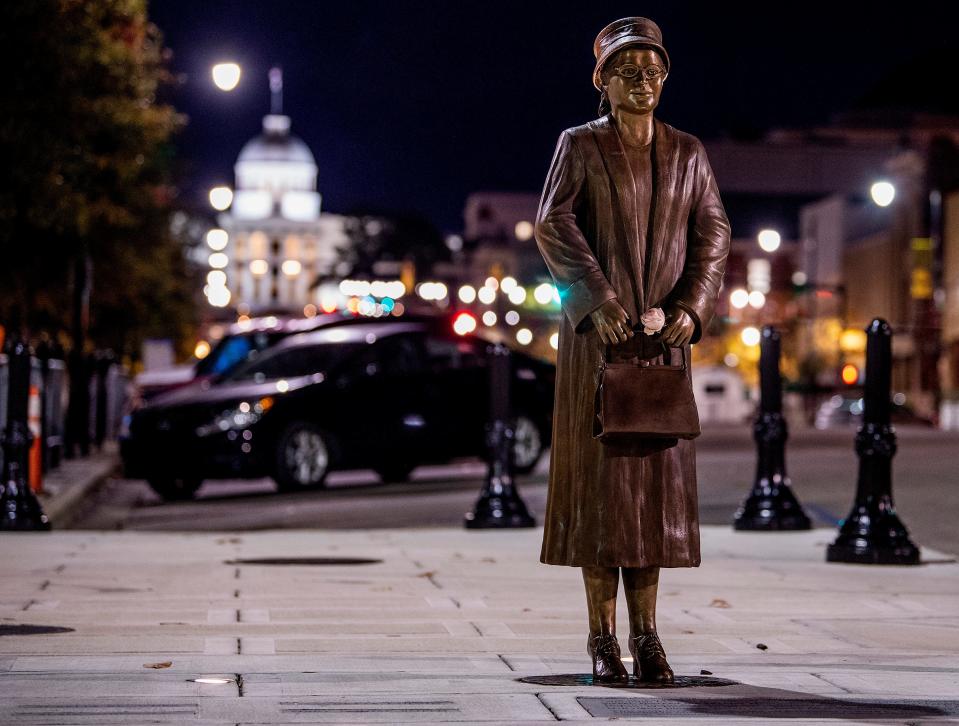They want silence around Rosa Parks | BRIAN LYMAN
- Oops!Something went wrong.Please try again later.
- Oops!Something went wrong.Please try again later.
The Rosa Parks statue in Montgomery’s Court Square is not what you expect from a monument. That’s why I love it.
There’s no pedestal. No stage. Nothing separating the viewer from Parks. It’s a life-sized and human-scaled depiction of a civil rights hero.
This is no divinely ordained messenger walking in the sky above us. This is a woman going home after a day at work – a dignified, respected citizen with a long track record of activism. She has a plan for the bus ride ahead.

The Court Square statue went up in 2019, and it’s started a trend in Montgomery. The Equal Justice Initiative unveiled a Parks statue in February at the Legacy Museum. Next year, a statue of the activist could appear on the Alabama State Capitol steps.
Three sculptures of a brave woman. Three places to celebrate Montgomery’s Black community confronting decades-old systems of oppression.
Three places where a teacher could take students to discuss that story, only to get fired by a school board. All thanks to the Alabama Legislature.
We now have a law that prevents our educators from discussing “divisive concepts.” I could go into the specific language, but that would imply that this is a good-faith effort to limit dehumanizing speech.
It’s actually state-sanctioned intimidation. The law aims to discourage teachers from discussing anything that might give a white Alabamian a sense of guilt.
So let’s say a fourth-grade teacher leads his students up the steps of the State Capitol in 2027 and passes the new Rosa Parks statue. He stops and tells his class what living through the Montgomery Bus Boycott was like.
It wasn’t 381 days of mild inconveniences. Carpool drivers got pulled over and ticketed for little or no reason. Homes were bombed, and Montgomery’s white leaders shrugged, even suggesting the protestors did it to themselves.
Most children hearing this tale would focus on the courage of Parks, Martin Luther King, E.D. Nixon and all those who joined them. But maybe there’s a white kid who notices the skin color of those who shrugged at the bombing of a family home. More likely, there’s a white chaperone who doesn’t like this talk and assumes the students have the same thin skin.
Under the law, the chaperone could complain to the local school board. And the local school board could discipline or even fire the teacher over the feelings these facts stirred.
And suddenly the teacher finds himself fighting for his job. He has to justify objective fact to elected officials in a state where pandering to white fear is always a winning political strategy.
Yes, the statute has language protecting academic freedom and due process. But who wants to go through that? It’s easier to walk by the statue, mutter something about freedom and move on.
That’s the goal of the legislation: to make it hard to talk about racism in Alabama, whether historic or contemporary.
And there’s plenty of racism that remains. The median income for a white household in Alabama is a little over $68,000 a year. For a Black household, it’s less than $41,000 a year.
About three-quarters of white Alabamians own their own homes. For Black Alabamians, it’s a little over half.
White parents go through the hell of losing an infant far less than Black parents do.
If this pointless suffering bothers you, you need to trace it to the sources: slavery and Jim Crow. The thread back there passes white elites openly stating their desire to steal the vote from Black Alabamians. It runs through the Pratt Mines, where innocent Black men seized by law enforcement and handed over to private enterprise died dark, suffocating deaths. It loops a Montgomery hospital, where in 1919 a white mob broke in and murdered a Black man.
This was the violent system Parks confronted. This was the government that defied the U.S. Constitution and dared its victims to complain. You can’t understand her courage without seeing the braying, bloodthirsty mob on the other side.
But Republican lawmakers don’t want you to see that.
Their past is granite, marble and brass: smooth, pretty and still. Historical figures stand on columns and pedestals, away from daily life and skeptical eyes. God’s inscrutable plans, miraculously culminating in the government we have today, matter more than the documented choices of men. History is just a sacred and inevitable path to the present.
In this narrative, Parks simply does what’s right. She doesn’t confront politicians who sabotaged a voting rights drive. She doesn’t battle smug and callous juries indifferent to the plight of Recy Taylor, a Black woman raped by six white men.
Parks walks on a frictionless path of righteousness. She is meek, mild and so self-evidently correct that everyone falls in line without fuss. The white establishment that attacked her and got away with it — the one our current white establishment descends from — is nowhere to be seen, replaced by a handful of isolated, easily-dismissed bigots.
Told correctly, the Parks story is as much about a violent, nihilistic government as the woman herself. Our leaders can’t have that.
So they want silence around the statues of Parks. They want to trap the woman in stone and steel and make her as dull and mute as any mustached Confederate on a Doric column.
They certainly don’t want anyone drawing parallels between the men Parks confronted and the leaders of today. The ones who make it hard to vote; who make it hard to teach; who make life hell for transgender youth and who say our public schools need purification.
You can’t talk about Rosa Parks without talking about what she faced. If that makes you uncomfortable, it’s because the people who opposed her look an awful lot like the people running Alabama today.

Brian Lyman is the editor of Alabama Reflector. He has covered Alabama politics since 2006, and worked at the Montgomery Advertiser, the Press-Register and The Anniston Star. His work has won awards from the Associated Press Managing Editors, the Alabama Press Association and Robert F. Kennedy Center for Human Rights. He lives in Auburn with his wife, Julie, and their three children.
Alabama Reflector is part of States Newsroom, an independent nonprofit website covering politics and policy in state capitals around the nation.
This article originally appeared on Montgomery Advertiser: They want silence around Rosa Parks | BRIAN LYMAN

